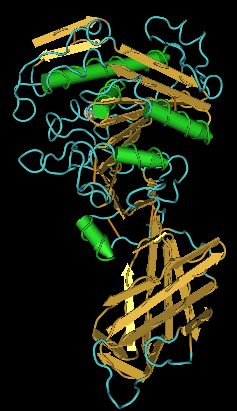
In biochemistry, lipase (/ˈlaɪpeɪs, ˈlaɪpeɪz/ LY-payss, LY-payz) refers to a class of enzymes that catalyzes the hydrolysis of fats. Some lipases display broad substrate scope including esters of cholesterol, phospholipids, and of lipid-soluble vitamins[1][2] and sphingomyelinases;[3] however, these are usually treated separately from "conventional" lipases. Unlike esterases, which function in water, lipases "are activated only when adsorbed to an oil–water interface".[4] Lipases perform essential roles in digestion, transport and processing of dietary lipids in most, if not all, organisms.
- ^ Cite error: The named reference
bilewas invoked but never defined (see the help page). - ^ Diaz, B.L.; J. P. Arm. (2003). "Phospholipase A(2)". Prostaglandins Leukot Essent Fatty Acids. 69 (2–3): 87–97. doi:10.1016/S0952-3278(03)00069-3. PMID 12895591.
- ^ Goñi F, Alonso A (2002). "Sphingomyelinases: enzymology and membrane activity". FEBS Lett. 531 (1): 38–46. Bibcode:2002FEBSL.531...38G. doi:10.1016/S0014-5793(02)03482-8. PMID 12401200.
- ^ Sharma, Rohit; Chisti, Yusuf; Banerjee, Uttam Chand (2001). "Production, purification, characterization, and applications of lipases". Biotechnology Advances. 19 (8): 627–662. CiteSeerX 10.1.1.319.7729. doi:10.1016/S0734-9750(01)00086-6. PMID 14550014. S2CID 18615547.